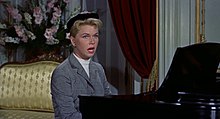| "Que Sera Sera (Whatever Will Be, Will Be)" | ||||
|---|---|---|---|---|
 Doris Day performing the song in the 1956 film The Man Who Knew Too Much. | ||||
| Single by Doris Day | ||||
| B-side | "I've Gotta Sing Away These Blues" | |||
| Released | May 21, 1956 | |||
| Recorded | 1956 | |||
| Genre | Popular music | |||
| Length | 2:03 | |||
| Label | Columbia | |||
| Composer(s) | Jay Livingston | |||
| Lyricist(s) | Ray Evans | |||
| Doris Day singles chronology | ||||
| ||||
"Que Sera, Sera (Whatever Will Be, Will Be)"[a] is a song written by the team of Jay Livingston and Ray Evans that was first published in 1955.[4] Doris Day introduced it in the Alfred Hitchcock film The Man Who Knew Too Much (1956),[5] singing it as a cue to their onscreen kidnapped son.[4] The three verses of the song progress through the life of the narrator—from childhood, through young adulthood and falling in love, to parenthood—and each asks "What will I be?" or "What lies ahead?" The chorus repeats the answer: "What will be, will be."
Day's recording of the song for Columbia Records made it to number two on the Billboard Top 100 chart[6] and number one in the UK Singles Chart.[4] It came to be known as Day's signature song. The song in The Man Who Knew Too Much received the 1956 Academy Award for Best Original Song. It was the third Oscar in this category for Livingston and Evans, who previously won in 1948 and 1950.[4] In 2004 it finished at number 48 in AFI's 100 Years...100 Songs survey of top tunes in American cinema. In 2012, the 1956 recording by Doris Day on Columbia Records was inducted into the Grammy Hall of Fame.[7]
It was a number-one hit in Australia for pop singer Normie Rowe in September 1965.
The song popularized the title expression "que sera, sera" as an English-language phrase indicating "cheerful fatalism", though its use in English dates back to at least the 16th century. Contrary to popular perception, the phrase is not Spanish in origin (in Spanish it would be "lo que será, será"), and is ungrammatical in that language.[3] It was evidently formed by a word-for-word mistranslation of English "What will be will be".[8]
- ^ Cite error: The named reference
FrontCoverwas invoked but never defined (see the help page). - ^ "The 29th Academy Awards | 1957". Oscars.org | Academy of Motion Picture Arts and Sciences. 26 March 2015.
- ^ a b Hartman 2013.
- ^ a b c d Roberts (2006:135)
- ^ Leigh (2001)
- ^ Whitburn (1987)
- ^ "Grammy Hall Of Fame - Hall of Fame Artists". Grammy Awards. Retrieved December 5, 2023.
- ^ Cite error: The named reference
:0was invoked but never defined (see the help page).
Cite error: There are <ref group=lower-alpha> tags or {{efn}} templates on this page, but the references will not show without a {{reflist|group=lower-alpha}} template or {{notelist}} template (see the help page).